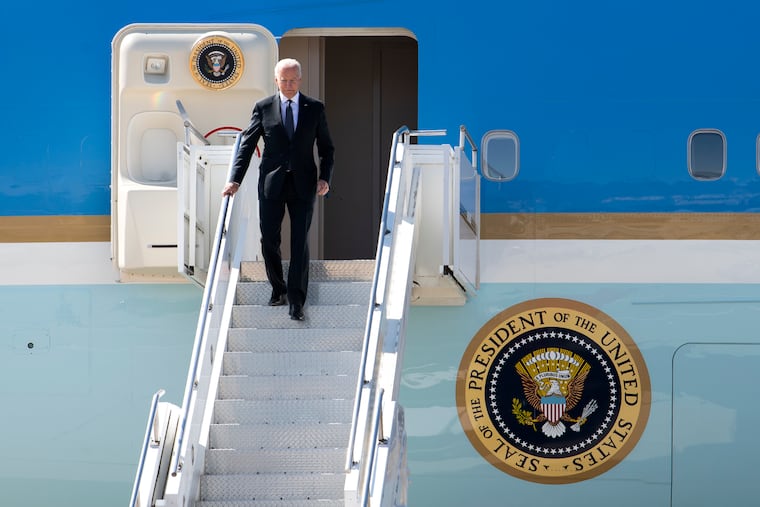Three cheers for Biden not holding a joint press conference with Putin | Trudy Rubin
The White House was wise to deny Putin a joint press conference platform for lies and propaganda, but Biden must push in private talks for truth on cyberattacks.

Give three cheers that President Joe Biden will not hold a joint press conference with Vladimir Putin after their summit meeting in Geneva.
I don’t mean to imply, as Russian and right-wing U.S. media do constantly, that the president has dementia and couldn’t hold his own. Rather, I’m relieved we won’t be subjected to a sideshow in which Putin promotes self-serving falsehoods and not-so-subtle jabs at Biden.
The White House decision to nix the presser reportedly came after a group of Russia experts “with firsthand knowledge of the onetime KGB colonel’s tactics and tricks” advised Biden not to give Putin the platform to distort what happened in the private meeting, according to the Axios news site.
One of the experts, former National Security Council Russia expert Fiona Hill, predicted to me that if a joint presser were held: “Putin will try to pull a fast one. He would be likely to [raise Biden’s age and] use the senile shtick.”
Hill imagined a Biden retort that 68-year-old Putin would soon enough reach Biden’s age in office since the Russian leader was making himself president for life. She also predicted Putin’s public response to any Biden criticism on human rights would be to turn the focus to America’s flaws. “If Biden says [Russian political prisoner Alexei] Navalny, Putin will say Jan. 6 [the date of the assault on the U.S. Capitol].”
» READ MORE: Biden-Putin summit tests the strength of democracy vs autocracy | Trudy Rubin
That kind of “whataboutism” would have achieved nothing. Canceling the joint presser underlines the need for a frank private discussion between the two leaders to clarify whether any basis exists for a working relationship with Moscow. It is past time for rhetorical games.
This White House move also underlines the contrast with the infamous joint press conference at the 2018 Helsinki summit between Putin and former President Donald Trump. Putin lied about meddling in the U.S. election; he also made a bizarre proposal that Russian intelligence be allowed to question U.S. and British citizens (who had annoyed Putin). Trump responded that he believed the Russian leader over U.S. intelligence agencies and seemed enthusiastic about Putin’s proposal to let his intel agents interrogate Americans.
Nothing like that will happen this time.
Moreover, the prevention of another Putin sideshow is a reminder that hostile rhetoric can box both sides into a corner. Even if it pleases the home crowd in both countries.
This is happening with China, where aggressive “wolf warrior” diplomats pour out fake charges against the United States. Secretary of State Antony Blinken felt compelled to talk tough to his Chinese counterparts at an Alaska meeting, spurring a 16-minute diatribe from the other side.
Meantime, Putin flat out denies blame for cyberattacks, poisoning opponents, and threatening European countries militarily, while posing as a champion of underprivileged Americans. And Biden concurs that Putin is a “killer.” True enough, but the U.S. president had to backtrack on his words before the summit meeting.
The Geneva summit will also test the premise that frank and serious discussions can happen in private if hostile public rhetoric is discouraged.
Even if the noise subsides, there are huge questions about how to deal with a Russian leader who lies about almost every issue of joint concern.
I asked Catholic University of America historian of U.S.-Russian relations Michael Kimmage how he thought Biden could deal with Putin’s studied dishonesty. “I’m not sure you can improve relations,” he replied. But he advised that, despite Putin’s lies, the United States needs to “initiate a working relationship and restoration of normal diplomatic ties. If not, you don’t have a way to mitigate serious conflict.”
That means resuming meetings between diplomats and officials at all levels, and perhaps negotiating the reopening of U.S. and Russian Consulates. Yes, such regular contacts are needed. Yet, I don’t see how a relationship can be built unless Putin backs off from his constant lies.
I believe the test case will come with cyber. Putin has proposed, most recently in an NBC interview, “for us to sit down calmly and agree on joint work in cyberspace.” Had there been a joint press conference, he no doubt would have promoted this idea to the max.
» READ MORE: The link between Navalny's fate and Biden's policy towards Russia | Trudy Rubin
Yet the Russian leader continues to deny — and make fun of — charges that the Kremlin has used cyberspace to attack U.S. elections, allegedly conduct the devastating SolarWinds attack on key U.S. agencies and businesses, and harbor cybercriminals who targeted the Colonial Pipeline, depriving the East Coast of gas at the pump.
He even had the gall to suggest a joint U.S.-Russian cybersecurity task force and an exchange of cybercriminals with the United States. (Biden, unfortunately, bit on Putin’s vague language, but his national security adviser, Jake Sullivan, quickly clarified there was no interest in such a “prisoner swap.”) Unlike in Russia, cybercriminals are held accountable in the U.S.
So in the end, the White House avoidance of a public clash does not diminish the need for eliciting some truths from Putin in private. Otherwise, the cyber test case will require a cyber pushback in kind.
Absent a joint presser, each leader will relay his version of what has been achieved in a separate press conference. Comparing those two versions will provide good clues as to the possibility of improved relations with Moscow down the line.